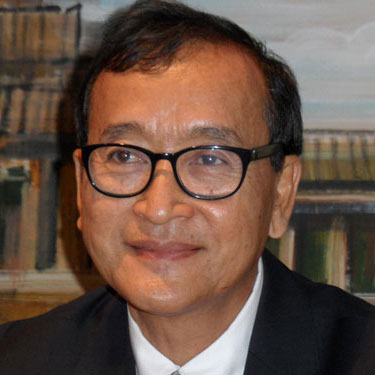The arrests and charges against three young, peaceful environmental activists in Cambodia shows that the repression of Prime Minister Hun Sen is not just directed against political opponents. It is also being used to silence anyone who has the courage to tell the truth.
The three Mother Nature Cambodia activists, Sun Ratha, Seth Chhiv Limeng and Ly Chandarvuth, were arrested on June 16 after they had documented waste being discharged into the Tonle Sap river. A fourth activist, the Spanish national, Alejandro Gonzalez-Davidson, the co-founder of Mother Nature Cambodia, was charged in absentia after being deported in 2015.
The activists have been charged with “insulting the king” although there has been no indication of how they are supposed to have done so. They face prison sentences of between five and ten years if found guilty, in prisons which are highly overcrowded. Cambodia’s legal system is fully under political control, so the conclusion to the case will be a political decision, rather than one based on evidence and legal process.
As American ambassador to Cambodia W. Patrick Murphy has stated, “documenting pollution is a public service, not terrorism. We urge authorities to be responsive to its citizens, not to silence them.”
Mother Nature Cambodia is a highly respected environmental group to which the government has previously been willing to listen. In 2015, the group convinced authorities to drop plans to build a hydroelectric dam in the Areng Valley, which threatened local communities. In 2016, the group’s work led to an official ban on the export of coastal sand.
Today, Hun Sen’s need to send a belligerent political signal is more important. If these activists lived elsewhere they would get recognition and awards for the service they have performed. Instead, their public-spirited actions have made them hostages of the Cambodian legal system.
Environmental activism has long been a dangerous undertaking in Cambodia. In April 2012, the activist Chut Wutty was shot dead while investigating illegal logging and land seizures in the forests near the Thai border. His work seen as a threat by Cambodia’s corrupt political and military elite and no-one was ever held to account for the murder.
Mother Nature Cambodia has also been targeted already. In September 2020, three other members of Mother Nature, Long Kunthea, Phoun Keo Reaksmey and Thun Ratha, were arrested for planning to organize a one-woman march to the prime minister’s house to highlight concerns over the development of one of the city’s last remaining lakes. They were fined and sentenced to 18 to 20 months in prison, where they remain.
Environmental disaster
The costs of the arrests to Cambodia are manifold and far-reaching. They are a disaster in environmental terms. The US has already ended funding for the government’s Prey Lang project. Illegal logging continues around the Prey Lang Wildlife Sanctuary, the US embassy in Cambodia noted, while the government silences local communities and civil society partners who voice their concerns.
Major urban development projects continue without the kind of critical scrutiny that Mother Nature Cambodia has sought to provide. Sand dredging in the Mekong river continues to supply landfill for planned satellite cities such as Koh Norea south-east of Phnom Penh. These projects will obviously affect water levels and the river’s ecosystem. Transparent public consultation on such major projects is essential, but the Cambodian government has not published any social or environmental impact assessments.
No-one should be fooled by the government’s environment-friendly window dressing. In June, Cambodia signed the Kigali Amendment to the Montreal Protocol on Substances that Deplete the Ozone Layer. What value does that signature carry if environmental activism is deterred by the threat of prison? Such initiatives are “greenwashing” in its most cynical form. The truth is that while the outside world seeks to achieve energy transition, Cambodia is still commissioning new coal-generation capacity.
The charges will certainly have a detrimental effect on non-Chinese foreign direct investment in Cambodia. There is no way that any proposed corporate investment in Cambodia would make it through the kind of Environmental, Social and Governance (ESG) screening process now used by most major companies. Any foreign company investing in Cambodia risks reputational damage which might never be repaired.
In political terms, the charges demonstrate the futility of setting up new opposition parties to provide a fig-leaf of democracy. The Cambodia National Rescue Party (CNRP) was dissolved on paper by the supreme court in 2017 because Hun Sen knew he could not win an election against it.
If these activists can be charged and imprisoned, it is clear that any structure that is created outside the CNRP can and will be repressed if it voices genuine criticism of the government – which is the legitimate role of opposition.
Just as important is the deterrent to environmental awareness that the arrests create. The public must be able to play an active part in stewarding the country’s natural resources without fear of reprisals. Without that involvement, protecting Cambodia’s environment will quickly turn into a lost cause.
The views and opinions expressed in this article are those of the author.

Sam Rainsy, Cambodia’s finance minister from 1993 to 1994, is the co-founder and acting leader of the opposition Cambodia National Rescue Party (CNRP).

